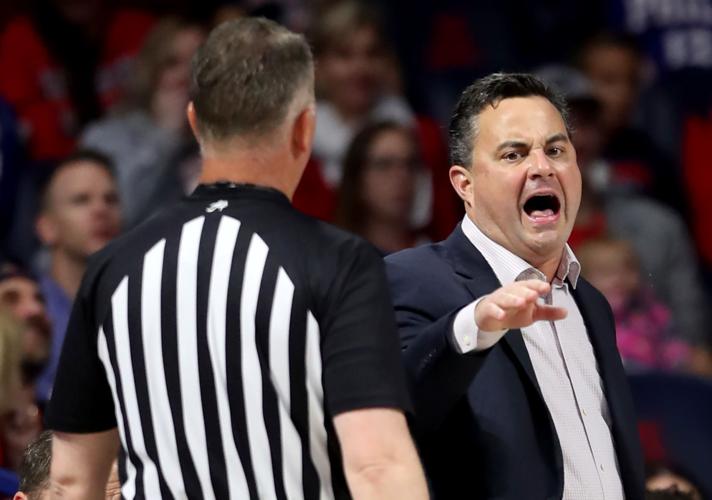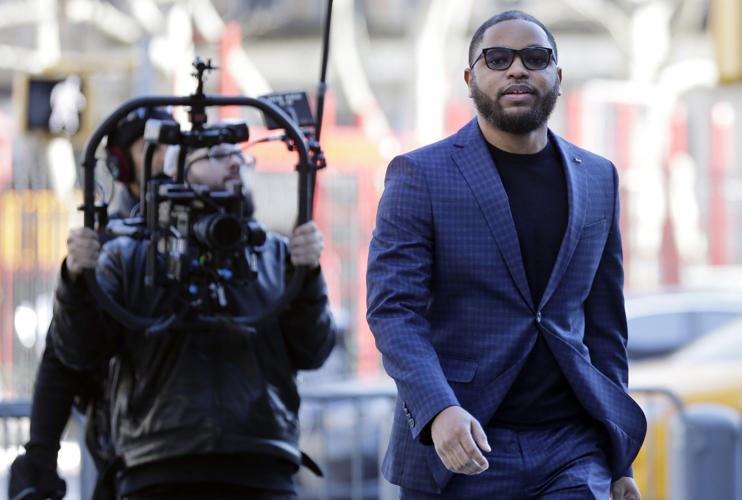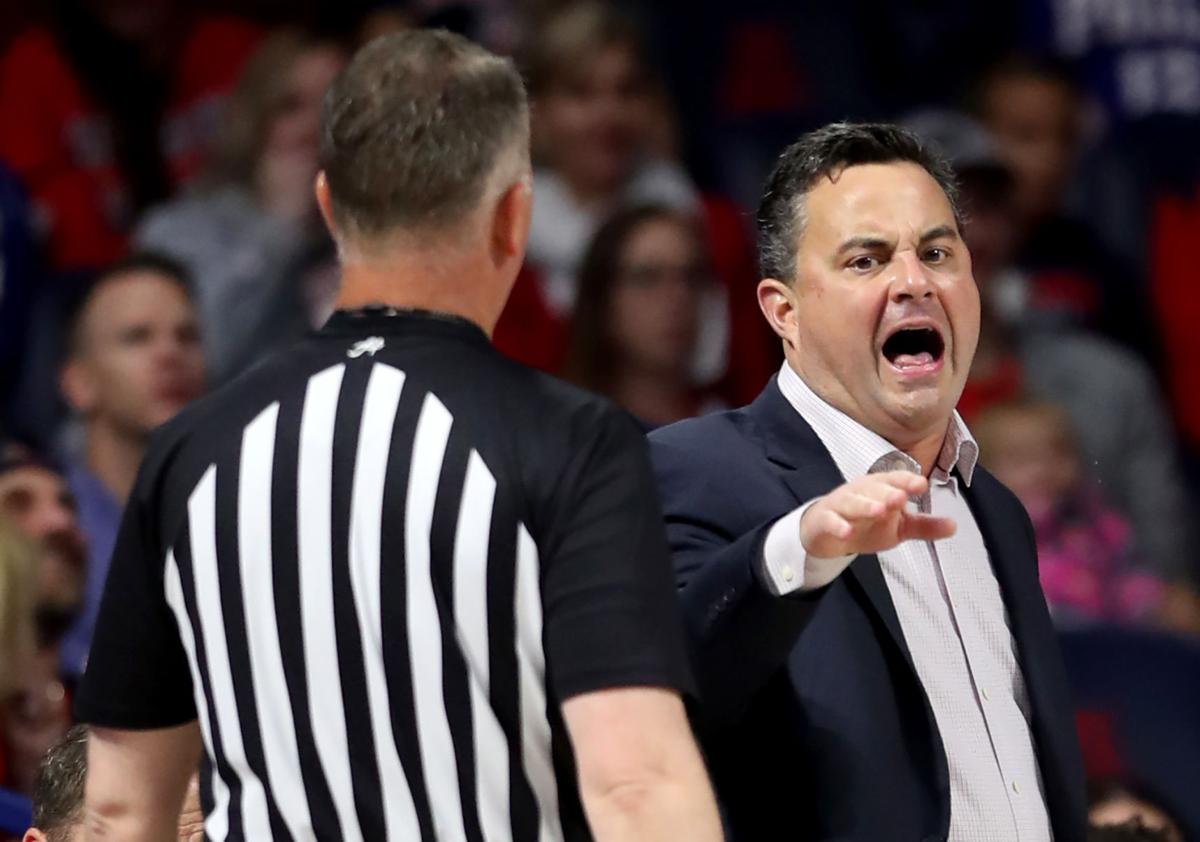Arizona’s decision Friday not to release its NCAA Notice of Allegations invites speculation about what violations the Wildcats have been accused of, and what the resulting penalties could be.
So let’s go. There’s plenty of publicly available evidence, precedent and information about the NCAA’s procedures to take an educated guess at what’s next:
1. What are the charges?
The one allegation certain to show up in Arizona’s NOA is former assistant coach Book Richardson’s admission that he accepted $20,000 in bribes in exchange for pledging to steer Wildcat players to an agent.
Richardson’s January 2019 plea agreement resulted in a three-month prison sentence. NCAA rules changes in 2018 allow for court and some other outside evidence to be imported into subsequent NCAA investigations.
Arizona could argue that Richardson was acting in its own self-interest, trying to line his own pockets rather than use them to help the Wildcats win basketball games. That’s the same argument Oklahoma State used after former assistant coach Lamont Evans admitted to taking $22,000 in bribes as part of the same scheme the FBI probed.
Oklahoma State was assessed the most serious violation, Level 1, and banned from the 2020-21 postseason. The school is appealing the penalty.
Besides, Richardson has indicated he didn’t keep all the money. He told the New York Daily News last month that “I was helping kids when they got on my campus, yes, I was,” and there was evidence in the federal trials that Richardson claimed he paid UA players.
In an FBI video played in federal court, Richardson said he paid the cousin of former UA wing Rawle Alkins about $2,000 a month. Recorded phone calls were also played where Richardson said he paid the family of onetime UA commit Jahvon Quinerly $10,000 and that paying players with his own money was causing him so much financial strain that he dipped into his retirement account.
Academic issues may have also been a part of the NCAA’s investigation. After the trial, Yahoo.com reported that a transcript not used in the trial quoted Richardson discussing with aspiring agent Christian Dawkins, partner Munish Sood and two undercover FBI agents about a plan to pay $40,000 to have a course added to Alkins’ high school transcript so that he would be eligible to play as a freshman in 2016-17.
In an issue not related to the federal investigation, UA moved to fire then-assistant coach Mark Phelps in February 2019 after ESPN.com reported he was accused of an NCAA violation regarding the academic transcripts of former recruit Shareef O’Neal. UA eventually chose to let Phelps’ contract run out rather than face a legal battle in firing him.
Early in the previous season, Phelps was suspended for two games and forward Keanu Pinder for one game because of unspecified NCAA violations. UA said the violations were not related to the federal investigation, but they could also have been included into the NCAA’s investigation.
Other evidence from the federal trials could have been part of the NCAA’s investigation, too. The father of five-star recruit Brian “Tugs” Bowen testified that Dawkins told him then-UA associate head coach Joe Pasternack offered $50,000 for his son to play at Arizona in 2017-18.
2. Was Sean Miller directly implicated?
ESPN.com reported in February 2018 that Miller discussed paying Ayton $100,000 with Dawkins, though that specific allegation did not surface in the federal proceedings.
However, the director of HBO’s “The Scheme” documentary, which focuses on Dawkins’ role at the center of the FBI’s investigation, said Dawkins “did have that conversation with Book” on July 20, 2017 — a conversation that is aired in the movie.
“We’ll see how Sean plays it out,” Dawkins tells Richardson in “The Scheme”. “You know what I’m saying? We’ll see if he’s a man of his word. Because he brought it up to me.”
Richardson replies, “Yeah, ’cause he need help. You know what he doing per month? I told you. Ten.”
During the spring 2019 federal bribery trial, the jury was shown a video in which Dawkins told his business partners — including an undercover FBI agent and cooperating witness Marty Blazer — that Miller told him “I’m taking care of everything myself” but wanted to “turn over everything to you.” Blazer testified that he thought it meant “Miller was taking care of payments to Deandre Ayton.”
Other recorded phone calls played before the jury in the spring 2019 trial included one in which Dawkins told Sood that Miller “fronted the deal” for Ayton, and another during which Dawkins said that Miller was “taking care of Rawle and them.”
UA issued a statement later that day saying it was taking the information in court “very seriously” and that it would continue to cooperate with the NCAA.
Following ESPN’s initial report, Miller sat out one game and spent another four days away from the Wildcats, while UA officials said they asked him pointed questions.
When Miller returned on March 1, 2018, he flatly denied ESPN’s report while saying he “never paid a recruit or prospect or their family or representative to come to Arizona. I never have and I never will.”
Dawkins said in “The Scheme” that Miller’s statement wasn’t true and that the coach “should be an actor” for his performance in delivering it.
“The Scheme” also aired a wiretapped conversation between Dawkins and Miller as they discussed five-star recruit Nassir Little, who was believed to be deciding between Arizona and Miami at the time (he ultimately chose North Carolina).

Christian Dawkins, above, asked Sean Miller in “real talk” what it would take to land recruit Nassir Little.
Miller asked Dawkins to explain “in real talk” whether he should focus on the coach or director of Little’s club ball team. Dawkins replied that “they definitely want to get some (expletive) for themselves.”
Miller then replied: “Miami doesn’t have an advantage over us in that area, do they?”
3. What if Miller didn’t break any rules himself or didn’t know rules were being broken?
The coach could still face penalties because NCAA Bylaw 11.1.1.1 basically eliminated plausible deniability among head coaches — and, if nothing else, Richardson has admitted to taking bribes.
The bylaw, which says head coaches can be held responsible for the actions of their direct and indirect reports, was a popular source of allegations last year.
According to the 2019-20 NCAA annual infractions report, 18 allegations were brought forward under head coach responsibility bylaws during the year — more than those covering “offers and inducements” (13), a “failure to cooperate” (11) or “impermissible extra benefit” (10).
Head coaches can avoid problems under Bylaw 11.1.1.1 by rebutting the presumption of responsibility, but it is a difficult standard that requires documentation of compliance efforts.
In a 10-page document the called “Responsibilities of Division I Head Coaches: Understanding rules compliance and monitoring,” the NCAA said head coaches should “actively look for red flags of potential violations” in such areas as asking how a recruit paid for an unofficial visit to campus, checking into prospects who are at-risk academically and asking “probing” questions of staffers.
Coaches can be suspended for up to a year if found guilty of a Level 1 violation of 11.1.1.1, or up to half a season if the infraction is viewed as a lesser violation.
4. Could Miller’s contract be affected?
Miller is contracted through the 2021-22 season.
The NCAA case is not expected to be resolved until at least the spring, when Arizona will likely be evaluating whether or not to offer an extension. It is nearly unheard of for a coach to carry only one year left on his contract at any time because of the resulting difficulty in recruiting.
Miller is scheduled to earn a guaranteed $2.9 million both in fiscal 2020-21 and next season, counting a base salary of $1.8 million plus $700,000 for peripheral duties and another $200,000 each from IMG and Nike. However, he is taking a $360,000 pay cut this season — 20% of his base pay — in a parallel move with UA’s campus-wide furlough and salary cut plan.
Miller would lose $1 million of a booster-funded retention bonus if he is either found guilty of a Level 1 NCAA violation or criminally charged, according to an amendment passed by the Arizona Board of Regents in April 2018.
5. So what’s next?
NCAA infractions cases can head several ways after a notice of allegations is sent to a school, and the process is rarely quick.
Schools are given 90 days to respond to the NOA, and the NCAA then has 60 days to reply to the school’s response.
The parties then meet with the infractions committee, which determines the violations and penalties. Appeals can be filed afterward.
The case can be settled more quickly through a “negotiated resolution,” when all parties agree on the violations and non-appealable penalties. Or they can go the “summary disposition” track, with parties agreeing on the facts of the case and the infractions committee issuing a decision that can be appealed.
The case can also be sent into the Independent Accountability Review Process, which was added in 2018 on a recommendation by the Rice commission that reviewed college athletics in the wake of the federal investigation into college basketball.
The independent review process can take even longer: The school, infractions committee or enforcement division all have the right to request a move to the IARP, sometimes months after the standard hearing process path has already begun.
“This adds, at minimum, maybe four or five months to the process, maybe a year,” says Stu Brown, an Atlanta-based attorney who counsels schools on NCAA issues.
Cases involving N.C. State, LSU and Kansas all recently moved to the IARP. Brown said the N.C. State and Kansas cases appeared to be moved because theirs involves a central question of whether Adidas was a booster for their schools. The first federal college basketball trial in October 2018 featured evidence that Adidas aided the programs in multiple ways.
LSU’s case was referred to the IARP by two NCAA committees because of Tigers coach Will Wade’s “lack of cooperation” to provide cell phone records for 13 months, according to The Advocate of Baton Rouge. Brown said the LSU case also had a high volume of records.
Arizona could be in for a long ride even if it goes the standard route.
The UA has until Jan. 23 to respond to the NOA, which would give the NCAA until March to reply back. An infractions committee hearing would take at least another month; even if a decision were reached in May or June, Arizona could then file an appeal that might take another six months.
“So you could be well into the 2021-22 basketball season — and that’s if there are no delays,” Brown said.
Which way Arizona’s case will head is a question made particularly difficult by the school’s decision not to release its NOA.
“If you don’t know the number of allegations, the level of allegations, whether they are unusual applications of the bylaws, it’s hard to say what would be merited,” Brown said. “I want to be real clear that allegations are just allegations: I think it’s important to take anything the enforcement staff says with some degree of skepticism.
“But that said, it may be that an Arizona notice of allegations is pretty straightforward … if only one assistant coach is named and if only one head coach control allegation is made and if there’s not a lack of institutional control allegation made. No need to go to the IARP.
“On the other hand, if you had multiple coaches charged individually, if you had a lack of institutional control, if you had a large number of alleged violations encompassing a huge number of documents, those would be things that would be more inclined to take it to the IARP.
“But because we don’t know what the notice of allegations is, it’s difficult to evaluate.”






